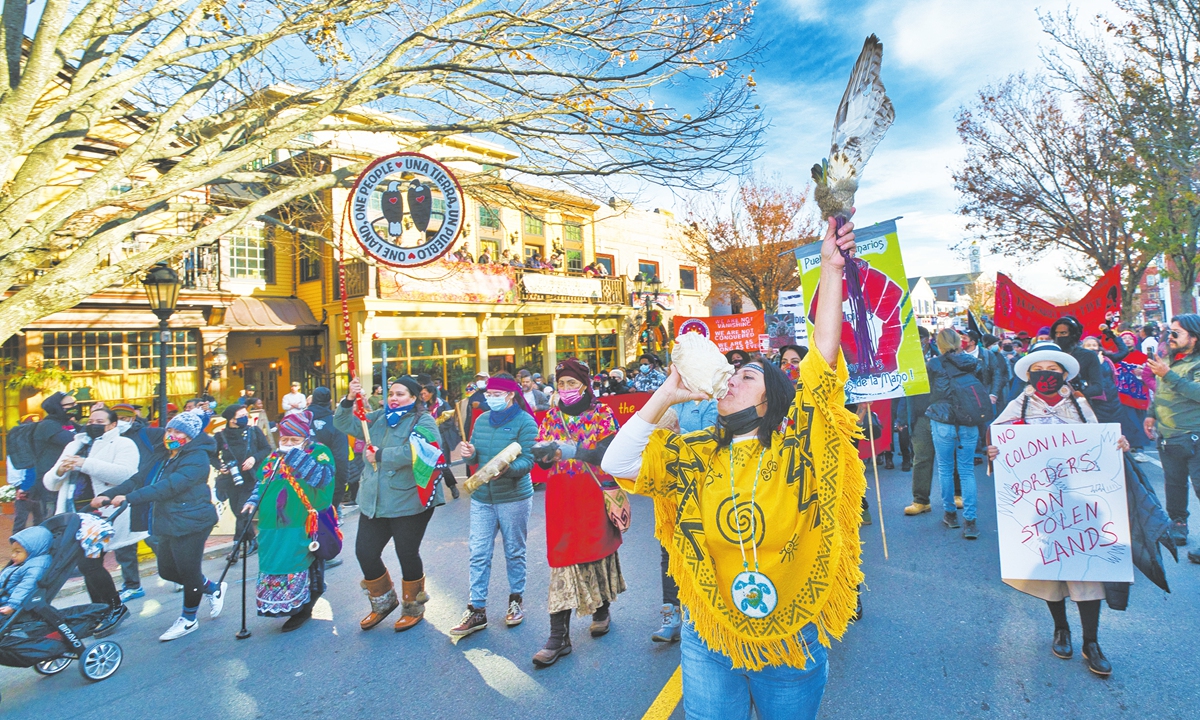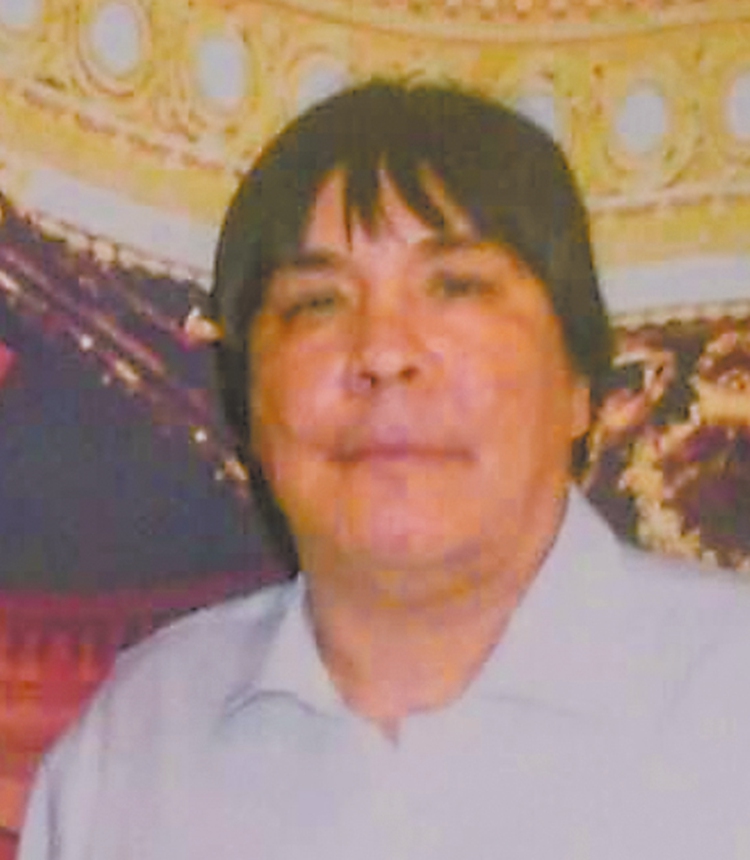
A group of over 1,000, mostly native Americans, marched through the town of Plymouth, Massachusetts, to mourn the violent history behind Thanksgiving on November 25, 2021. Photo: VCG
Editor's Note:
Leonard Peltier, the 79-year-old Indigenous activist who has spent nearly 50 years in prison for the 1975 murders of two FBI agents but has long maintained his innocence, was denied parole in early July, according to the CNN. Many are concerned that the ruling means that the longest-imprisoned Indigenous American will die behind bars. Over the years, his family has struggled to scrape together funds and fend off blowback from the high-profile case. In Global Times (GT) reporter Wang Wenwen's I-Talk show, Chauncey Peltier (Peltier), Leonard's oldest son, recalled how his father's case had impacted his life and the struggles and mistreatment facing the Indigenous people in the US. He told the Global Times that he runs a non-profit organization called peltierjustice.org to educate people on his father. "The story of my father, even after he's gone, needs to stay alive," he said.
GT: How did your father's case change life for you and your family?
Peltier: It's been rough for the whole family. Throughout the trial, they withheld evidence, corroborated witnesses and falsified the ballistics. Being incarcerated all these years for something he didn't do has been pretty rough for my father, especially for the first 20 years.
A lot of the police would harass my family, and ask how my "cop-killing father" was. We always knew that he was innocent. We prayed a lot, and my family always had hope that the government and the FBI would do the right thing and release him.
When they extradited him from Canada, as a 10-year-old boy, I remembered the FBI following me. I remember that they were searching everybody as we went into the courtroom, and I remember the FBI agents that were following me around that day. One of the agents came into the searching room and told the sheriff that he would take this one, referring to me. He had me up against the wall searching me and he twisted my arm behind my back and told me that my murderer dad would never walk free. As a young 10-year-old boy, that scared me. For many years thereafter, I was very worried all the time, as during the first 20 years of my father's imprisonment, the police and the District Attorney wanted to lock me up because of my father.
I was always pretty concerned about that and this deeply affected me. And then as I grew up and became an adult, some of my friends were police officers who followed this case and understood that he was wrongfully incarcerated. Some of them, who I grew up with, told me that I had to make sure that I don't give them something to arrest me for and lock me up.
I did get in a little trouble here and there, but I thank God for watching over me and making sure I never ended up incarcerated.
GT: Your father has been in prison for 47 years. Why were his paroles rejected despite claims that he is innocent? Do you think his identity as a Native American is a factor?
Peltier: For 500 years, the government has been trying to terminate the native Americans for land and resources. They weren't just happy with a little bit of the land. They wanted it all. They tried to exterminate my people with chicken pox and measles, and they killed all the buffalo, saying the buffalo was affecting the trains that they were building through the country at the time.
In history, they don't acknowledge a lot of the wars that my people have actually won. And the only one that they really talk about is the one with General Custer, where he got killed. But actually, Indigenous people from America had won many wars. We were a big threat to them as they wanted to steal the land. Today, people don't realize that they still don't honor treaties.
Leonard falls under 1980 federal guidelines, which stipulate that he's supposed to be eligible for release for health reasons. But they still don't want to honor any of that.
Living with so much injustice for so many years is pretty disappointing. America claims to be the "land of the free." Well, but only for a few chosen ones. There are so many innocent people in prison who shouldn't be there. I don't know how they could brag about being "the land of the free" and you are "innocent until proven guilty."
In America, we used to call it white privilege. If you were white, you would get a lighter sentence than a black or native man. Today, I believe there's no more white privilege. It's more about the amount of money you have. The money you have can buy you out of anything. That's the reality of America today.

Chauncey Peltier Photo: Courtesy of Peltier
GT: Your father's case mirrors the struggles facing the Indigenous people in the US. Do you think this issue will ever be addressed by the US government?
Peltier: I don't think the US government will be happy until they have all the land from the Natives. I worry about my people that have lived on the reservations all their lives.
My grandma moved off the reservation in the early 1960s because of the boarding schools. She didn't want her kids going through that. She and her sisters were not allowed to pray and practice their cultural traditions, which we have had for thousands of years before the white man showed up. That was taken away from us and we didn't really get that back until the 1970s. During that time, a lot of my people would have to practice our cultural traditions in secret for fear of being arrested and sent to prison.
When the white man showed up here, I want to say we were 50 to 60 million strong. The government made it to where if you are not tribal enrolled, then you weren't considered Indigenous from America. And in a native way, it has always been that if your parents were Indigenous, you would always be an Indian. So a lot of our bloodlines have weakened now, because of the tribal bloodline requirement. What our tribes need to do is push, so that we can call ourselves Indians and decide who are Indians. They designed it so that our bloodlines would get weaker and weaker. The government will not claim that people that are only 1/4 Indian or 1/8 Indian are Indian. That's their way of taking the rest of the land from us.
GT: The US often accuses other countries, like China, of genocide against ethnic groups. Why do you think the US does not recognize its own genocide against Native Americans?
Peltier: That's pretty hypocritical. Why do they accuse everybody else of genocide when they haven't even recognized what they did to my people? They always say you have to clean out your own closet before you go looking around in somebody else's closet. They have never admitted what they have done to our people. One of the politicians wrote an apology, but it wasn't much of an apology. They should honor the contracts and the treaties that they had with native Americans before they start pointing the finger at others.
Not all white people are like that. A lot of them are sympathetic. A lot of them support native Americans, a lot of them feel bad about what happened to the native Americans. It's mainly the government that is to be blamed. They want it all. They want to be the sheriff of all the countries. My cousin who was in the military said to me, "We're kind of like the sheriff of all the countries." I replied, "Why can't we mind our own business and take care of our own business over here?"
Xiao Bowen contributed to this article





